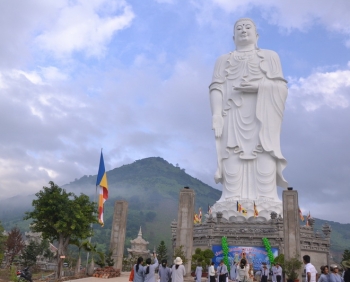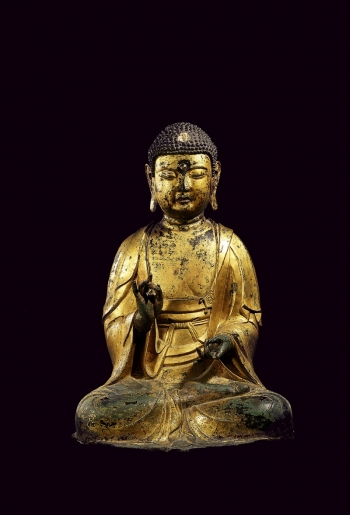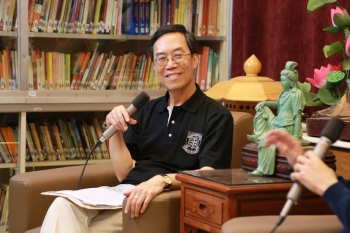Exclusive Practice
As classified by Master Shandao, the de facto founder of Pure Land Buddhism in China, the Pure Land teaching of Amitabha Buddha is known as the Path of the Great Vow, while the Pure Land teaching of Shakyamuni Buddha is known as the Path of Importance.
According to the Path of Great Vow, exclusivity is emphasized in the Pure Land practice, so it is called ‘exclusive practice.’ When Master Shandao explained the core statement in the Amitabha Sutra: If a good man or woman hears of Amitabha Buddha and holds fast to his name for one day … or seven days, single-mindedly and without deviation, he said that “he teaches us to recite Amitabha’s name with two-fold exclusivity.”
What is meant by “two-fold exclusivity”?
“Single-mindedly” is exclusivity, and “without deviation” is also exclusivity. To do something single-mindedly is to do it to the exclusion of all other things. And to perform a task without deviation is to perform it exclusively, without turning to other tasks. Thus there is “two-fold exclusivity” in exclusive practice in the Path of Great Vow.
“Single-mindedly” means with one mind, not two minds; the focus is exclusivity. “Without deviation,” means without mixing in other elements. It also connotes exclusivity.
It doesn’t matter whether we can achieve a state of meditative concentration in our recitation. So long as we exclusively recite the name of Amitabha Buddha in consistent and persistent manner, we will certainly be reborn in the Pure Land.
Another way to interpret “two-fold exclusivity” is elaborated in the Commentary of the Contemplation Sutra. Master Shandao established the Five Primary Practices in Pure Land Buddhism, which are defined as follows:
(1) exclusive reading – reading the three Pure Land Sutras only
(2) exclusive observance – observing Amitabha Buddha and his Land of Bliss only
(3) exclusive reverence – bowing to Amitabha Buddha only
(4) exclusive recitation – reciting the name of Amitabha Buddha only
(5) exclusive praising and making offerings – again to Amitabha Buddha only.
This is the first level of exclusivity.
Out of these Five Primary Practices, according to Master Shandao, exclusive recitation is the ‘karma of assurance’and the other four primary practices are supplementary only. It is because oral Amitabha-recitation is specified in the fundamental vow of Amitabha Buddha, thus we should follow what Amitabha Buddha wishes and asks us to do. This is the second level of exclusivity.
Why is it necessary to be ‘exclusive’ in the practice? It is because of the fundamental vow that, for the sake of being reborn in the Pure Land, the practitioner has to recite the Buddha’s name. As a result, the entire matter of our rebirth in the Land of Bliss is undertaken and guaranteed by Amitabha Buddha. The practitioner relies totally on Buddha’s power (‘other-power’). It is simple and straightforward, and is known as ‘the recitation of Amitabha’s name, according to his Fundamental Vow (the 18th vow).’
Exclusivity is also a keyword to show to sincere faith on the deliverance of Amitabha Buddha, which is the approach taken by the Pure Land practitioner in accordance with the 18th vow.
Another reason of exclusivity in the Pure Land practice is a bit more sophisticated. That is because the Land of Bliss is a realm of unconditioned nirvana. It means that everything is pure and homogeneous, natural and ordinary, same and equal. Even the cause of rebirth in the Land of Bliss for all beings is one, and is common to all. The only cause is Amitabha-recitation. The practitioner receives the ‘real’ and ’substantial’, splendid and supreme merits and virtues of the name of Amitabha Buddha, enabling him to be reborn in the Land of Bliss.
We have already discussed the importance of exclusivity in the Path of Great Vow. Please refer to the previous article “Two Buddhas, Two Teachings” - Differences in Practices.”
Mixed Practices
As the practice of Pure Land Buddhism, according to the Path of Great Vow, is Amitabha-recitation only, it is known as ‘exclusive practice’. Any practices other than Amitabha-recitation in Pure Land Buddhism are regarded as ‘mixed’.
In terms of ‘mixed practice’, there are three different scenarios:
(I) With respect to the practices in the Path of Importance
In the Path of Importance, one must practice the meditative and non-meditative virtues, and then dedicate the merits and virtues for rebirth in the Land of Bliss. It is regarded as ‘mixed’ because the practitioner cultivates various merits and virtues for dedication, instead of Amitabha-recitation.
(II) With respect to both the Path of Importance and the Path of Great Vow
Depending on the individual’s attitude towards the teachings of the two paths by the two Buddhas, some people may like to take both teachings at the same time. Whether they treat them as equally important, or put more emphasis on the Path of Great Vow, they are generally regarded as ‘mixed practice.’
(III) With respect to the Five Buddha-invocation Practices
Master Shandao identified Buddha-invocation in five different practices. If the practitioner does not follow the Five Primary Practices as defined, i.e. :
1. reading – reading other sutras, apart from the three Pure Land Sutras
2. observing – observing other Buddhas and their pure lands, apart from Amitabha Buddha and his Land of Bliss
3. paying reverence – bowing to other Buddhas, apart from Amitabha Buddha
4. reciting – reciting other’s Buddha’s names, apart from Amitabha Buddha’s name
5. praising and making offerings – praising and making offerings to other Buddhas, apart from Amitabha Buddha
All these are regarded as ‘mixed practice.’
(IV) With respect to the Five Exclusive Practices
Apart from exclusive Amitabha-recitaion, we practice the supplementary practices of (1) exclusive reading – reading the three Pure Land Sutras only (2) exclusive observance – observing Amitabha Buddha and his Land of Bliss only (3) exclusive reverence – bowing to Amitabha Buddha only and (4) exclusive praising and making offerings – again to Amitabha Buddha only.
Out of these five exclusive practices, according to Master Shandao, exclusive recitation is the ‘karma of assurance’ because it accords with the fundamental vow of Amitabha Buddha. If the practitioner performs the Five Primary Practices, he is NOT regarded to be in ‘mixed’ practice.
Exclusivity is the main characteristic of pristine Pure Land Buddhism
Master Shandao said in his Commentary of the Contemplation Sutra, “Exclusive Amitabha-recitation is emphasized in all three Pure Land sutras.
He further says: “The 48 Vows of the Infinite Life Sutra explain only that exclusive recitation of Amitabha Buddha’s name leads to rebirth in the Land of Bliss. The Amitabha Sutra shows that, whether for a day or seven days, recitation of Amitabha’s name results in rebirth. The passages on meditative and non-meditative virtues in this sutra [the Contemplation Sutra] underscore only that exclusive name-recitation leads to rebirth.”
The three Pure Land sutras are the principal text of Pure Land Buddhism, and all other sutras that mention Amitabha Buddha are for reference only. Shakyamuni Buddha introduced the teaching of salvation of Amitabha Buddha for the sake of delivering ordinary beings in the three Pure Land sutras. He also tells us that karmic forces will not bind us, and Amitabha Buddha will welcome us when we die.

















